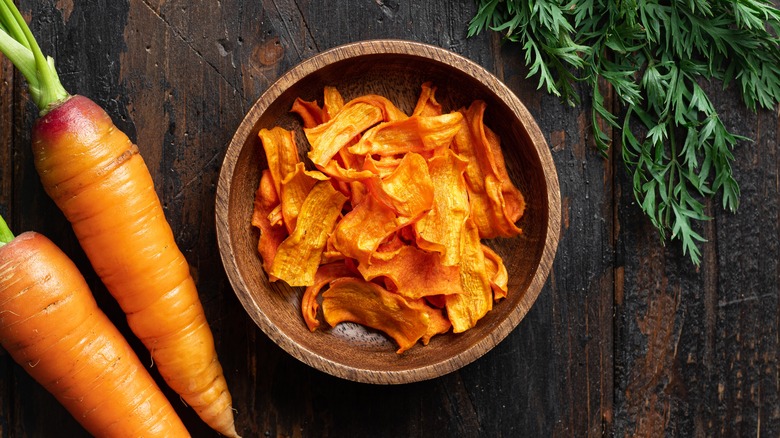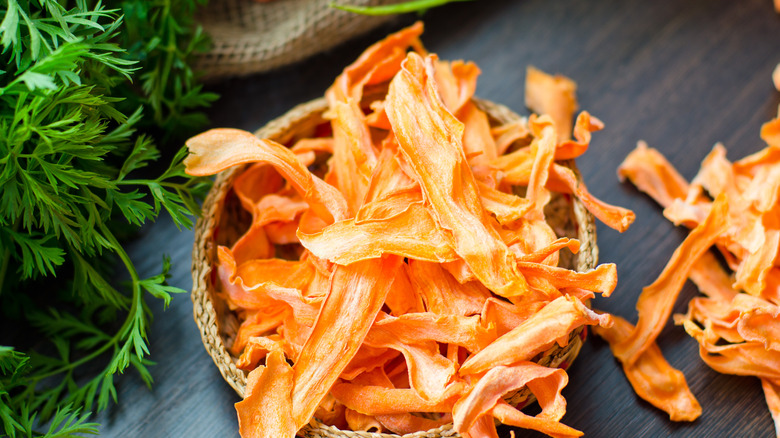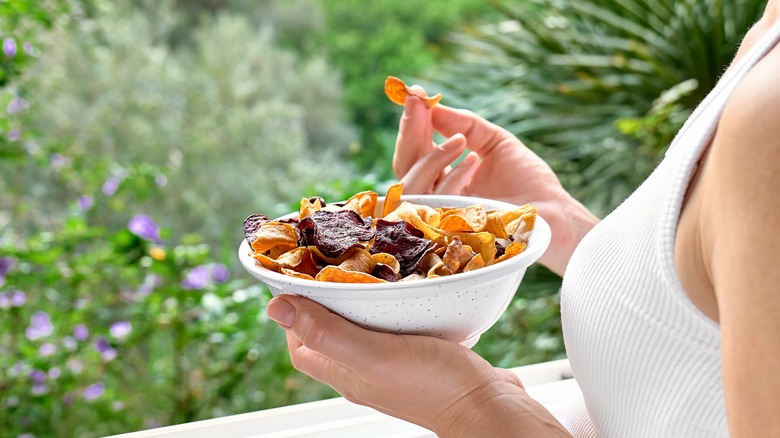Carrots About To Go Bad? Dehydrate Them In The Oven
Whether it's squash, spuds, or shallots, if it grows in from the ground, we'll eat it. There are over 1,000 different vegetable species that grow on Mother Earth, and one of our favorites is also one of the most underrated — carrots. Balanced in equal parts with a sweet and earthy flavor, carrots are refreshing, versatile, and packed with nutrients. As much as we love them though, carrots don't last forever. When properly stored in the refrigerator, carrots can last up to a month, which has a pretty substantial shelf life compared to other vegetables (all the more reason to love them). Even though they can last weeks before spoiling, eventually they will go bad, and food waste is a major culinary faux pas, so if you ever notice that your carrots are on the brink of expiration, dehydrate them in the oven.
Not only are you developing sustainable cooking practices by not throwing out your carrots, but you're also extending their already lengthy shelf life. Dehydrated vegetables can last for up to a year, and when vacuum sealed, can stay fresh for many years to follow. Although you can enjoy them as they are, dehydrated carrots are easily rehydrated by introducing them to moisture, which means you can enjoy them in their true form months after dehydration. Plus, dehydrated carrots will maintain their color, flavor, and most of their nutrients so you don't have to worry about diminished quality.
Tips for dehydrating carrots
Dehydrating produce is a relatively easy process. But before you crank up the oven heat to dehydrate your bushel of carrots, you'll want to keep a few tips and tricks in mind to achieve the perfect batch of dried carrots.
For starters, always clean your carrots before you begin the dehydration process. Carrots grow in the ground, so it's not uncommon for dirt and earth to cling to their flesh. Plus, washing produce before consuming it reduces the risk of contracting foodborne illness. Peeling the carrots is entirely optional. The skin of the carrot tends to be a bit more bitter than the sweeter-tasting interior, but the choice is yours.
To fully maintain the color, texture, and overall quality of the carrots, blanch them for a few minutes before beginning the dehydration process. Blanching prevents the deterioration of carrot quality by deactivating specific enzymes. Once they've finished balancing, cool them off under cold water or in an ice water bath to halt the cooking process for further preservation of color, texture, and flavor.
To effectively dehydrate the carrots, you can set the oven temperature somewhere between 125 and 135 degrees Fahrenheit and place them on a mesh screen on top of a baking rack where they can take up to 8 hours to fully dehydrate. Once they are crispy, to maintain freshness, store them in air-tight, moisture-proof containers and use them as needed!
Uses for dehydrated carrots
Although they can be rehydrated, oven-dried carrots won't be the same as they were when you first purchased them, which means they have slightly different uses. But if you're not sure how to put them to use, save your thinking cap for another day — we've got you covered.
Whether you keep them in your pantry or on hand for an outdoor hike, you'll be surprised at just how many ways you can utilize dehydrated carrots. Add dehydrated carrots directly to soups and stews during the cooking process where they will absorb the broth, rehydrate, and bring their well-balanced flavor profile and crisp texture to the pot, complementing your recipe's lineup of meats, veggies, spices, and herbs. If soup is out of the question, bring dehydrated carrots into baked casseroles where their concentrated flavor adds an earthy twist to the dish. Keep them as they are and mix them into a classic trail mix recipe where they'll provide a hint of folksy flavor and a vibrant orange color. If you're feeling sweet, grind dehydrated carrots into a powder for including in baked goods like muffins, sweet breads, and cakes, bringing both flavor and color into your favorite desserts. If all else fails, enjoy them as a potato chip alternative.
Whichever way you choose to use them, you can take pride in knowing that you've reduced food waste by repurposing your carrots via dehydration. Eco-friendly recipes and carrots for the win!


